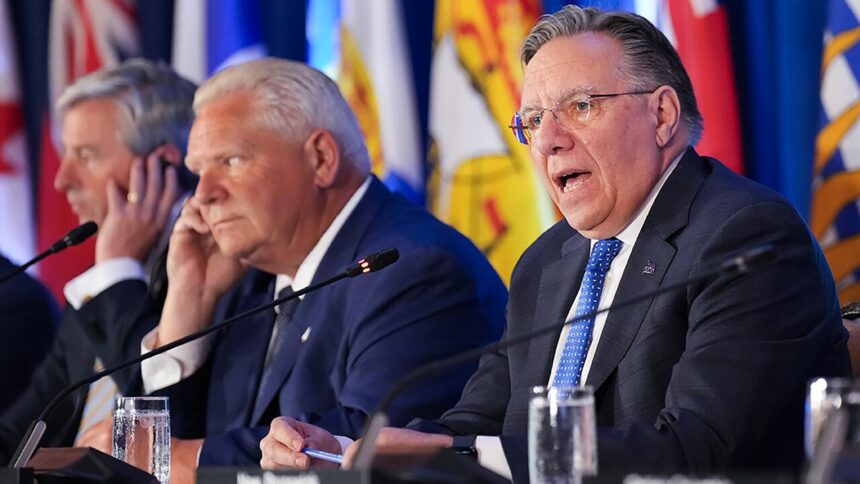In an unprecedented display of provincial solidarity, Canada’s premiers gathered yesterday in Halifax for their annual Council of the Federation summit, placing bail reform and healthcare funding at the forefront of their collective agenda. The high-stakes meeting comes amid mounting public pressure for systemic change in both areas, with premiers unified in their calls for federal action despite their diverse political leanings.
“We’re seeing a growing consensus across provincial lines that the current bail system is failing to protect our communities,” Nova Scotia Premier Tim Houston told reporters as he welcomed his counterparts to the maritime province. “When repeat violent offenders are cycling through our justice system, Canadians rightfully question whether public safety is being prioritized.”
The bail reform discussion emerges following several high-profile cases where individuals released on bail later committed serious offenses. All thirteen premiers signed a joint communiqué demanding that Ottawa implement stricter bail conditions for offenders charged with violent crimes, particularly those involving firearms. This rare moment of unanimity underscores the urgency premiers are attaching to this issue, transcending the partisan divides that typically characterize federal-provincial relations.
Healthcare funding, the perennial concern of Canadian intergovernmental affairs, dominated the second day of discussions. Premiers collectively expressed frustration with what they characterized as inadequate federal health transfers, pointing to strained emergency departments, surgical backlogs, and healthcare worker shortages plaguing their respective systems.
“We’re not simply asking for more money,” said Quebec Premier François Legault. “We’re asking for sustainable, predictable funding that allows us to implement long-term solutions rather than short-term band-aids.”
The premiers’ healthcare demands include an immediate increase to the Canada Health Transfer to cover 35% of provincial and territorial health spending, up from the current 22% federal contribution. Their unified position reflects growing concern about the sustainability of Canada’s healthcare system in the face of an aging population and post-pandemic pressures.
While the summit presented a united front on these core issues, observers noted underlying tensions regarding implementation details. Some provinces favor targeted funding approaches, while others insist on unconditional transfers that respect provincial jurisdiction over healthcare delivery.
“The premiers may agree on the broad strokes, but the devil is always in the details,” noted Dr. Katherine Henderson, president of the Canadian Association of Emergency Physicians, who attended as an observer. “What matters most is translating these discussions into tangible improvements for patients waiting in hallways and healthcare workers facing burnout.”
The federal government’s response has been measured. Justice Minister David Lametti acknowledged concerns about bail reform but cautioned against oversimplified solutions, while Health Minister Jean-Yves Duclos reiterated that additional funding must be tied to measurable outcomes and data sharing.
As the summit concluded, premiers committed to continuing their advocacy with a coordinated approach, scheduling regular meetings with their federal counterparts on both issues. The gathering demonstrated that despite regional differences that often dominate Canadian politics, certain challenges have become too pressing to allow partisan or jurisdictional disputes to impede progress.
As Canadians continue to rank healthcare and public safety among their top concerns, the question remains: will this rare display of provincial unity be enough to catalyze meaningful federal action, or will it become another chapter in Canada’s long history of intergovernmental impasses?
























